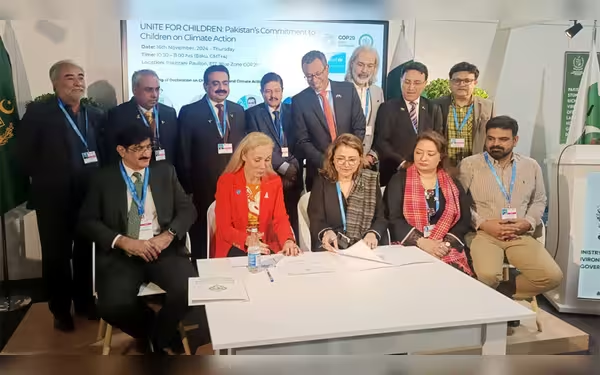Saturday, November 16, 2024 07:41 PM
Pakistan UNICEF Partnership to Protect Children from Climate Change
- MoU signed to safeguard children's future from climate risks.
- Focus on health, education, and development amid climate challenges.
- Call for collaboration to empower children against environmental threats.
 Image Credits: radio.gov.pk
Image Credits: radio.gov.pkPakistan and UNICEF sign MoU to protect children from climate change, focusing on health, education, and resilience against environmental threats.
In a significant move to protect the future of its youngest citizens, the Government of Pakistan has joined hands with UNICEF to combat the alarming effects of climate change. This partnership is encapsulated in a newly signed Memorandum of Understanding (MoU), which aims to prioritize the safety and well-being of children in the face of environmental challenges. Climate change poses a serious threat to children, affecting their health, education, and overall development. With rising temperatures, unpredictable weather patterns, and natural disasters becoming more frequent, it is crucial to take proactive measures to shield the most vulnerable members of society.
The MoU was officially signed by Aisha Humera Moriani, the Secretary of the Ministry of Climate, alongside the Deputy Executive Director of UNICEF. This declaration emphasizes the urgent need for action regarding children, youth, and climate initiatives. By collaborating with UNICEF, Pakistan is not only acknowledging the risks posed by climate change but is also committing to implementing strategies that will mitigate these risks and promote a sustainable future.
Children are often the most affected by climate-related disasters. They face health risks from pollution, are at a higher risk of malnutrition due to food shortages, and can suffer from educational disruptions caused by extreme weather events. This MoU is a step in the right direction, as it aims to create a framework for addressing these issues comprehensively. It highlights the importance of integrating climate education into school curriculums, ensuring that children are not only protected but also empowered to understand and tackle climate challenges.
Moreover, this partnership is a call to action for all stakeholders, including government bodies, non-governmental organizations, and communities, to work together in safeguarding the rights of children. It is essential to foster a culture of resilience, where children are equipped with the knowledge and tools to adapt to changing environmental conditions. The collaboration between Pakistan and UNICEF serves as a reminder that investing in children today is an investment in a sustainable and prosperous future.
The signing of this MoU is a pivotal moment for Pakistan as it seeks to address the pressing issue of climate change and its impact on children. By prioritizing the needs of the younger generation, the government is taking a crucial step towards ensuring their safety and well-being. As we move forward, it is imperative that this commitment translates into tangible actions that not only protect children but also empower them to be the leaders of tomorrow in the fight against climate change.













